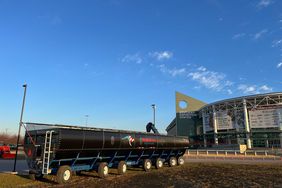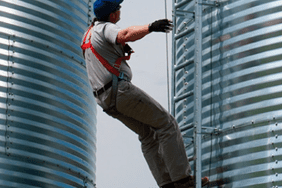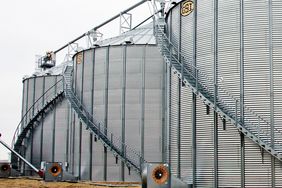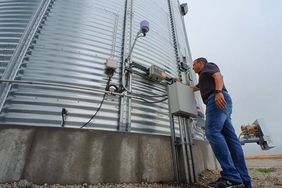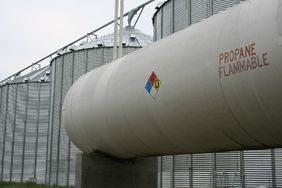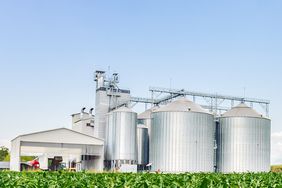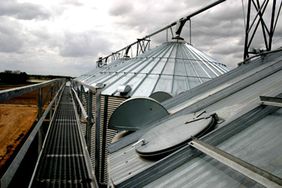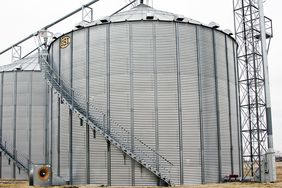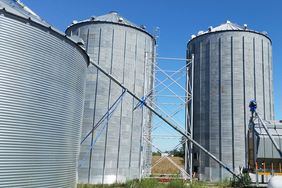:max_bytes(150000):strip_icc()/102333849-2-92c6c2fe72de4c7fbaefe13eb6eac474.jpg)
Ted Kennedy, one of three owners of Midwest Bulk Organics, a new organic soybean processing facility that's being built near Joliet, Illinois, said when he and his business partners were pricing out grain bins, it made little sense to purchase new when he could get used at half price.
The organic soybean processor is a fledgling company so volumes, to start, are expected to be pretty small, meaning they didn't need the extremely large bins. While they might not be ideal for everybody, the smaller, less-expensive bins are ideal for a company such as his, said Kennedy, who bought bins with a capacity of about 52,000 bushels.
"We saved about 50%" from buying new," he said. "We were under some budget and timing constraints, which is why we went with used grain bins."
Smaller grain bins are economical and may make sense for a small shareholder or, as in Kennedy's case, a start-up that's just getting off the ground, said Michael Langemeier, an agriculture economics professor at Purdue University in West Lafayette, Indiana.
Leasing is also an option, but finding a bin that can be leased near one's farm might be challenging, he said. Growers looking to purchase a used bin should ensure there are no leaks, that the roof is in good shape, and that it matches up with their elevator equipment, otherwise it's not a good deal no matter the price, he said.
Finding the right size is also a challenge. Larger producers aren't going to be interested in the used bins that are for sale because they're usually too small, but those without large capacity needs should be able to find some good deals.
Randy Wood, the owner of Woody's Used Grain Bins, who said he's seen his business grow almost fourfold from when he started five years ago.
Wood, who not only sells but also installs the bins, said he fields about 50 calls a day from producers looking for used equipment. He said the price of a used bin is about half of new. The company has, for example, a 48-foot, 61,000-bushel bin for $24,000.
The per-foot and per-bushel cost for that particular bin is a decent deal considering a lease rate of 14 cents per bushel per year, which equates to about $8,500 a year if it's full, Purdue's Langemeier said.
"Leasing for three years is going to be more expensive than that bin, so if that bin is in good shape, that's pretty reasonable," he said.
Demand is coming from all points across the Midwest with most calls originating in Iowa and Illinois, the biggest producers of both corn and beans. Most of the producers with whom he speaks are looking for economical ways to expand their storage without breaking the bank, especially when crop prices are low, Wood said.
"We're seeing more need for storage on farms," he said. "Some already have a lot of infrastructure in place but want to add storage. We're staying good and busy."
The amount of demand varies from season to season, as does the call for various sizes. This year, for example, he's selling a lot of 36-foot bins whereas last year everybody wanted 48- to 60-foot bins. He said he couldn't pinpoint a reason for the variation in demand, but adjusted his buying accordingly.
"The situation changes from year to year," he said. "There's no rhyme or reason. The year before last we sold 30-foot bins by the ton and this year I don't know if we've even had a call for a 30-foot bin."
Chad Henderson, a market adviser at Prime Agricultural Consultants in Brookfield, Wisconsin, said buying used bins may work for small landholders or startups like Kennedy's Midwest Bulk Organics, but are definitely not ideal for larger growers hoping to store bushels until next year, considering the weak carry in the market right now.
"If a guy has 1,000 acres and has 200,000 bushels of corn and already has 100,000 bushels in storage, he's going to want a 100,000-bushel bin," he said. With the December 2017-December 2018 spread now at about 15 cents, "that wouldn't even cover the interest" on a small bin.
Kennedy said because his volumes are expected to be low for a while, he invested in the smaller grain bins. He said, however, if business picks up in the near future then he'll likely shift to bigger, possibly newer, bins if there's a need.
"We wouldn't mess around competing with the ADMs and Cargills of the world – we crush organic beans, so it's a much smaller volume," he said.
